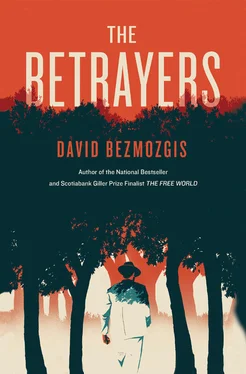Tankilevich turned his head and looked at the window behind which Kotler stood. There was no confusion. It wasn’t nighttime, and the glass played no optical tricks. Kotler didn’t flinch from Tankilevich’s gaze, nor did Tankilevich avert his eyes. They looked at each other through the glass. And now what did he detect on Tankilevich’s face? A flare of recalcitrance that quickly guttered. And what of his own face? What did Kotler present? The same expression he had presented to the KGB and all the subsequent adversaries. Unyielding calm. An expression of come-what-may. No — more than that. An expression that invited come-what-may.
Though it seemed to pain him body and soul, Tankilevich put one foot in front of the other and trudged toward Kotler. If this is the way it is to be, Kotler thought, then this is the way it is to be. He moved from the window and went to meet Tankilevich. If they were to have this encounter he preferred not to have it in this small room, contained and constricted, but outdoors, with the sun and the air and the expansiveness of the sky, as befit a free man.
Tankilevich stood in the yard, waiting for Kotler to appear.
Along the wall of the house was a wooden bench — seven slats nailed together — and an upended zinc tub. Tankilevich thought to sit on the bench or to lay the eggs on the base of the tub. It had a lip that would keep them from rolling off. He bent and carefully placed the eggs down on the tub, his nerves and the need for concentration amplifying the geriatric tremor in his hands.
In the hallway, Kotler spied Leora and Svetlana in the kitchen. Both women eyed him expectantly. He acknowledged them with a quick cheery nod and continued to the side door. Stepping out into the yard, he saw Tankilevich stooped and intent over the metal tub, where the eggs rested in a line along the edge of the slightly convex surface. A hollow metal tapping sounded as Tankilevich put the last egg down with its fellows.
— I see you have your own little kibbutz.
— Oh yes, it’s some kibbutz, Tankilevich said. We’re four chickens from the grave.
— That’s a lot of kibbutzes today.
— Too bad.
— I agree, Kotler said.
— How nice. Is that all? Or is there more you came to say?
Tankilevich had his first good look at Kotler in the flesh. Over the years, he had of course seen his picture in the papers and marked his progress. But to see a man in the flesh was a different matter. How had the years treated him? Forty years ago, he had been a skinny, quick-witted, balding, shabbily dressed young man. Shabbily dressed even for Russia in the 1970s. Tankilevich, who cared to dress better, had allowed himself to feel superior. Now Kotler was still shabbily dressed. His shirtsleeves were too long; the cuffs dangled. His trousers were baggy, even though he had gained weight. Only his shoes were worth envying. They were clearly from abroad, not something you could find at the bazaar. The shoes declared him a foreigner. The shoes and his expression. The easy, confident look of a person who lives his life in a better country. Kotler had prevailed and he had come to lord this over Tankilevich.
— Volodya—
— Chaim.
— Chaim, Chaim. For the last time, I didn’t come here to say anything to you. I had no idea you lived here. Not in Ukraine. Not in Crimea. Not in Yalta. In fact, I had no idea whether you were living at all. Nor did I spend much time on this question.
— I wrote a letter.
— What’s that?
— I wrote a letter. To Chava Margolis.
— And?
— Ten years ago.
— All right.
— She didn’t tell you?
— Chaim, despite your fervent Zionism, it’s clear you’re not keeping up with the news from Israel.
— I keep up perfectly well. I watch the Russian television. I read the Russian press. And a friend informs me of the Hebrew. He gets it on the computer.
— Then perhaps this bit of news eluded you. Or perhaps it didn’t rate over here.
— What news is that?
— The news of my Jerusalem trial. Chava Margolis was one of the witnesses for the prosecution. She and Sasha Portnoy. A few others too. The plaintiff was another activist. He made some outrageous claims against me in print. I defended myself and he brought a suit against me for libel. Shapira. From Gomel. Is the name familiar?
— No.
— Well, he had a very intricate thesis worked out, in which I had not been an agent of the American intelligence services, as you accused me of being, but rather an agent of the KGB. And that my Moscow show trial had been doubly fabricated. A show trial in which I, the defendant, had been in league with the authorities who were prosecuting me. In other words, I merely gave the very convincing impression of passionately defending myself and the Zionist movement, whereas, in fact, I was opposed to the movement and used the trial process as a way to expose other activists. Genuine activists like Chava and Sasha and, presumably, Shapira. And that it was because of me that they were imprisoned and exiled. You see? That I, who pretended to be the great hero, and who was celebrated above all the others, was in fact a traitor and a party to a deception of unprecedented complexity and mendacity. That I was heartless enough to put those closest to me, my parents and my young bride, through terrible anguish for more than a decade. And that while my family believed I was being kept in deplorable conditions in Soviet jails and camps, and while they moved heaven and earth to win my freedom, I was actually luxuriating in some undisclosed location, a client of the KGB. That, in essence, I was the worst traitor of all. Worse even than you.
— They mentioned me in the trial?
— Of course. You were my accomplice. Naturally. We plotted together.
One of the chickens had skittered over to them and now cocked its pert, imbecilic head at Tankilevich. With an angry swipe of his foot, he sent it flapping.
— When was this trial? he asked.
— Ten years ago.
— The same time I wrote to Chava.
— Evidently. Had I known you were alive, I could have called you as my witness.
— How so?
— To recount how we plotted together.
— No, we didn’t plot together. But if, over my head, you plotted with the KGB, how would I have known about it?
— Over your head?
— Yes. It was in my letter to Chava. I explained everything to her. How I did not write that statement in Izvestia. How they merely appended my name.
— I see. And was it a look-alike who testified against me at the trial and confirmed the substance of the letter?
— It was I but under duress. They also had me on medication. It was all in the letter to Chava. Which I expected she would share with others.
— She might have shared it with others, but not with me. I haven’t spoken to her since the Jerusalem trial. And I’ve seen her only once, unavoidably, at a gathering of refuseniks in the Ben Shemen Forest. What valuable information did she fail to impart to me?
— A great deal. But I can see that you’re not interested in it.
— That’s not true. But if by not interested you mean that I don’t believe anything you say will change the material facts, that’s right.
— The material facts?
— Facts that most sensible people — not conspiracy theorists — consider to be established. You gave false witness against me to the KGB.
— I gave, but I was forced.
— It was the Soviet Union; who wasn’t forced? A few degenerates. But most people aren’t degenerates. Everyone was forced. Some nevertheless managed to resist.
That second trial. Kotler avoided speaking or thinking about it. It had been a disgrace to them all. Even though he’d been acquitted, he’d come away wounded — in stark contrast to his Soviet trial, where, though convicted, he had come away invigorated. To sit in an Israeli courtroom and see Chava and Sasha looking at him with the same cold rectitude they had once reserved for the KGB. Terrible.
Читать дальше












